Michael J. Sullivan's Blog, page 80
July 20, 2012
Because its Fans that Keep Me Writing

In case you haven’t heard…it’s hot.
My office is upstairs where all the heat goes, so traditionally I take the summer months off from writing. I still work—if you can call anything I do these days work besides cleaning the house or getting the car inspected. But I don’t write, I scribble ideas, outlines, and research in my notebooks at coffee shops, libraries, bookstores, and while bicycling. This year however my wife bought me a fan. Not just any fan, a Dyson bladeless thingy with a hoop like a cross-section slice of a small rocket engine set on a white cylinder that looks like it ought to be able to grind coffee. As crazy as it is, it works and has managed to keep me at the keyboard.
Due to requests from various online forums I’ve kicked out a few short stories—not my forte, but I have a hard time saying no. I’ve also been working on novels. I’ve finished three since finishing work on Percepliquis, and am presently deep into my fourth. If you’re a fan, (especially if you’re the bladed sort) don’t go crazy. Just because I write a book doesn’t mean I’ll publish it. I don’t want to sell crap anymore than you want to buy it, and at least one of those books isn’t ready, and might never be. However, two of the books are definite keepers.
I should warn you that I don’t intend to remain a strictly invented-world fantasy author anymore than I intend to eat only chicken for the remainder of my life. I think the quickest way to ruin a career, is to lose interest in it. Doing the same thing repeatedly can have that effect. So while I love all of you who have appreciated my novels and asked for more, I’ve promised myself never to write for money, (as long as I can help it) which means I won’t seek to please anyone but myself. I think any other path leads to the dark side.
I need to stay challenged to keep things fresh and fun, so don’t be surprised if the next work you see is science fiction, a thriller, or mystery, or if the style of writing is a little different. I might use more profanity if I feel the story calls for it, and they might not always have happy endings—but hopefully always satisfying ones. That’s not to say I am giving up on IWF (invented-world fantasy) or even Riyria. Some of the novels I’ve already finished are IWF and I have plans for more, but I will be taking a break now and again to play in other sandboxes. Hopefully some of you will join me, and the rest will not be too irritated while they wait.
Having said all that, this last weekend, Orbit and I reached an agreement so they will be publishing me again, which is why I’m not telling you any details, not even the titles of the books I’ve completed, as I am certain Orbit will want to make the announcement.
So for those of you wondering if I’ve been drifting on an inflatable raft in a topical lagoon trying not to spill my umbrella drink for the last year—fear not, for I have a bladeless fan…hopefully I still have a few breathing ones too.
Published on July 20, 2012 07:07
July 2, 2012
More Marc
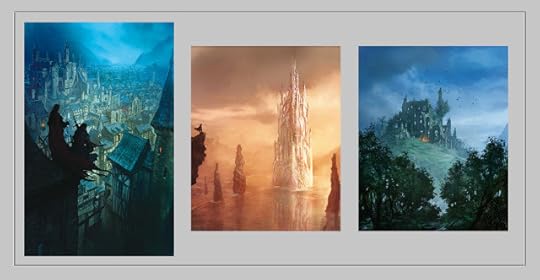 Click to Enlarge
Click to EnlargeI know I keep posting the cover art that Marc Simonetti has done for the French editions of the Riyria series, but he has a new one and I just think they look great when laid out together. So here is the art for The Crown Conspiracy, Avempartha and now Nyphron Rising.
I find it flattering that Mr. Simonetti has mimicked a little of my original covers in his designs. I get to see what my ideas could have looked like if I had that kind of talent.
To see more of Marc Simonetti's cover art visit his web page or go to his Deviant Art page.
Published on July 02, 2012 08:49
July 1, 2012
So You Want to Write a Novel
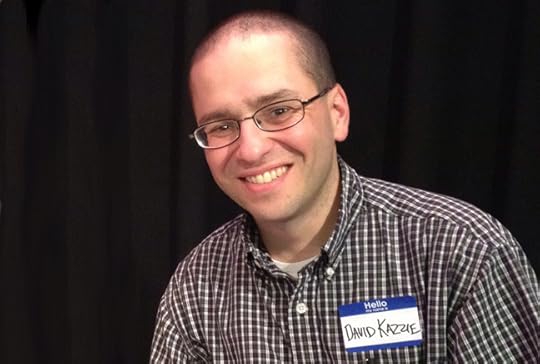
If you’re a writer, or want to be, have access to the Internet and haven’t seen the video So You Want To Write a Novel yet, I have to wonder what rock is presently your home address. It debuted near the end of 2010 and I’m not exactly certain where I first saw it but it seemed everywhere for a while. The video was so ubiquitous I never wrote a post on it before now because doing so would be redundant. Why am I mentioning it now?
This weekend my wife Robin was invited to speak at the James Rivers Writer’s group in Richmond. She was on a panel discussing self, independent, and big six publishing. Before the show, we went to lunch with the panel’s moderator, a man by the name of David Kazzie. We chatted for a while until at some point the topic of the afore mentioned video came up.
Robin and I raved about its brilliance and humor. Like the original Star Wars, we’ve both seen it a dozen times and it is still a joy to watch. Not only is it hilarious, but true. I’ve met people like this, something David Kazzie was surprised to discover, because you see, David Kazzie is the genius who created the best talking teddy bear video ever! We were in the presence of greatness.
We wanted to figure a way to get JRW to show the thing on a giant screen for the audience because it really should be required viewing for anyone thinking about writing a novel. It was too late to find an IMAX screen, which left this blog as my only recourse. So if you haven’t seen it, follow this link to David’s website. If you’ve already had the pleasure…can you believe I met this guy! I only wish there was a way to get his video autographed.
Published on July 01, 2012 11:42
June 25, 2012
Greener Grass

I don’t write short stories.
There is a school of thought that aspiring authors should learn their craft by writing short stories, get a few published, and then put out a novel. I think this is analogous to a musician learning to play a violin well enough to stage a few shows, then switching to the piano for a concert. Both require knowledge of music, but these are two very different instruments, and knowing one will help with the other in only rudimentary ways.
It’s not like I’ve never written short stories. My first agent explained she would have an easier time selling my first book if I obtained a few short story publishing credits. I wrote a couple, but my book had been published before I sent those out. And it’s not that I don’t like them, I just have a hard time cramming novel-thinking into 4,000 words.
Last year, between the disappearance of my self-published novels and the Orbit books debut, there was a few months where I had nothing out. My wife Robin asked me to write a short story to help fill the void. She suggested something like, Royce and Hadrian: the early years. So I wrote about an incident that occurred about a year after the two first met. This was called The Viscount and the Witch. I gave it away, and the story remains free, available in a number of places—including this blog.
This year something different happened.
I was asked, along with a few other professional authors, to donate a short story to an anthology designed to promote aspiring authors whose works would be chosen by a contest. The theme of the anthology was post-apocalyptic. Robin wasn’t certain I could do a post-apocalyptic short story, so I had to try just for ego’s sake. Over the weekend I hammered out a story I called Greener Grass. Robin was very impressed, but the story wasn’t exactly post-apocalyptic. Technically I think I could make a case for it, but before I bothered, Ray Bradbury died.
This got me thinking about a tribute story and Robin suggested a tale about the fate of ebooks in a post-apocalyptic future. So then I banged out another short story called, Burning Alexandria. More post-apocalyptic certainly, and just as good. So that was done.
But I still had Greener Grass.
Robin suggested I publish it as a short. Better that than sit in my drawer. Only it’s not fantasy…its science fiction, and has a distinctive voice of its own and much different than The Riyria Revelations. For those interested, the short is now available (Amazon| Barnes and Noble), and here’s the teaser: He wanted to escape his problems. He wanted to see the future. He never considered what the future wanted.
Confronted with suffering a painful death from cancer, Dan Sturges, a retired Ford’s engineer, foregoes treatments to try an idea of his own. After reading a theoretical article in Scientific American on time displacement, Dan builds a time machine in his garage. With nothing to lose but a few months of pain, Dan pins his hopes on a future where cancer might have been cured, or at least a quicker death by electrocution. But what happens after he presses the button is more shocking than the eighteen car batteries he connected himself to.
I'm also running a poll about the short story. It's just a single question and any feedback you can provide would be helpful.
Published on June 25, 2012 08:13
June 12, 2012
Proud To Be A Nerd
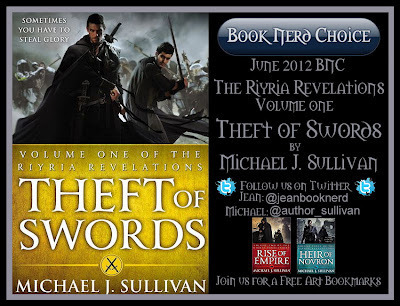
Jean Vallesteros is a nerd, but not just any nerd—a book nerd—or so she proclaims on her website. I don’t know Jean personally, but this June Jean has declared to be Theft of Swordmonth, and that caught my attention. Authors are easy that way. Astronauts require ticker-tape parades, actors red carpets, but authors are more than satisfied with being picked book-of-the-month.
In this case Book Nerd’s Choice of the Month, or BNC.
The idea, if I understand it correctly from reading Jean’s website, is that she is inviting everyone who walks this planet to join her in reading Theft of Swords and then discussing the story on her blog site. At the end of the month Jean will put up a poll for readers to chose which character they like most, and this choice will determine the subject of art work that an artist will create for bookmarks, which everyone will receive just for participating in the discussion.
Now I was just there and I noticed the comment section was …well…light? Twelve days into June? Granted Theft of Swords is not a short book, but I know there are people who have read it in two days. Also Jean has invited folks who previously read the book to come and rant or rave as well.
I know someone out there has read this book. Maybe even two or three, and I’m fairly certain some have opinions and comments about it. And while it might reflect poorly on the popularity of my novel, I actually feel bad for poor Jean. She picked a book that she thought would draw people to her site, a book she hoped would be a fun time for all, and instead she has a wonderful concert of crickets.
So if you have a moment, and an observation, criticism, speculation, complaint, or question about Theft of Swords, or me, consider visiting Jean Book Nerd.com and leaving a comment. I’ll be checking in there over the course of the month to answer question I find—Jean doesn’t know this yet, but she should have expected as much when she declared June to be Theft of Sword’smonth—like a porch light to an attention starved moth, I swear.
So make a comment and get a bookmark. Remember, for only the effort of a few keystrokes, you too can help a blogger—do it today.
Published on June 12, 2012 08:37
June 8, 2012
It’s All Just Luck

Luck is what determines the success or failure of a novel.
I’ve heard this statement a great deal lately, and not only do I disagree with the logic (or apparent lack thereof), I find it a bit insulting to anyone who has ever accomplished any measure of success in any field.
I personally don’t accept that luck even exists, especially with respect to how people often perceive it.
As defined by Websters: A force that brings good fortune or adversityAs per Wikipedia: …good fortune which occurs beyond one’s control, without regard to one’s will, intention, or desired result.
Websters appears to indicate luck is a form of energy that might be measurable. In this sense, which I suspect is prevalent in the mainstream consciousness, luck is a myth, a form of superstition.
In the Wikipedia version, the word luck appears to be a way of giving a name to almost any event that the witness is incapable of understanding. Luck is then another word for magic. Lightning was believed to be magic too, until it was understood.
My take is to argue that luck is nothing more than mathematical probability. Yet because the numbers and variables are so vast and varied, most people can’t calculate a definite probability for success, so it’s easier to believe the results to be magic, or the more socially acceptable term: luck.
To clarify just a bit, I think luck is actually the mathematical probability of a random event occurring. If you subscribe to the concept that luck is what determines if a novel becomes a success then you should also understand that this same rule applies to everything (because it would be silly to think luck only applies to novels.) Your chance of graduating college, getting cancer, or winning gold at the Olympic games is all a matter of luck.
Consider what the chances are of a person getting a novel on the bestseller’s list if they never wrote a book, sought out a publisher, had any dealings with agents or other literary types, and isn’t famous? I’m guessing most people are thinking zero. However if luck is the only factor in publishing success, then this person who never wrote a book, or had interest in doing so, would stand an equal chance of hitting that coveted list as someone who spent years perfecting their craft, submitted novels to traditional publishers, and even tried self publishing.
At this point I hope it’s obvious that it isn’t JUST luck.
On the other hand, those who guessed the person in the above paragraph has a zero chance, would be wrong. Everyone stands at least a one percent chance. (Even a person who doesn’t play the lottery might find a winning ticket among dead leaves along a curb.) I know this is true because I met a man at Balticon who is being pursued by major publishers and literary agents even though he knows nothing about writing, isn’t famous, and has no interest in writing books. He merely stumbled on something they think will sell, blogged about it, and now it has gone viral. He will likely—through no effort or intention on his part—have a bestseller on his hands. Does this prove luck exists? No, it proves everyone has a base chance of one.
If you play the lottery and buy two tickets instead of one, you’ve doubled your odds. Can buying two tickets make you twice as lucky? Or is it just doubling your mathematical probability? If you buy all the tickets you’ve improved your odds to a sure thing. When you win, will it still be luck? If you write a great book and promote it well, do you think you will stand a better or worse chance of getting lucky than if you write an awful book and never promote it?
Does that mean a person with a great book and great marketing will be a bestseller? No. Just as a person who doesn’t try can sometimes win, so too can a person who does everything right still fail, but the odds of this happening are just as small as a person winning the lottery with just one ticket.
So baring the small possibility that you will hit that one percent of “bad luck” then you can significantly increase your probability by writing and promoting well. The corollary of that then says if your sales are low the fault lies with either the quality of your book, and/or the effectiveness of your marketing. Authors don’t like to hear this. One person recently accused me of being cruel to aspiring authors for stating such. (Not that I deny having been cruel to aspiring authors, just ask anyone in my critique group.) I simply feel that being polite doesn’t help an author make a bad book better. Lying to them, or remaining silent will only leave them floundering in the dark and condemned to an endless prison of failure. Explaining the problem—as unpleasant as it is to hear—grants writers the chance to fix their problems.
The real issue comes up when authors who think they are good don’t know the meaning of that word when it applies to selling novels. There are those who spend significant time and money perfecting their craft and yet get nowhere. These are often people with masters and PhDs in writing and literature who declare success must not be about skill, but rather based on sheer luck—because if it was all about skill, they would be successful. What they fail to understand is that good prose, originality, and wonderful sub-text doesn’t necessarily translate into sales success. Even critical acclaim doesn’t necessarily generate significant sales. Don’t believe me, look up the list of the bestselling novels of all time then compare that to the list of Pulitzer Prize winners.
But not all popular books are good!
I’m not talking about the subjective judgment of good verses bad writing here, (if you want that see my previous post on objectively badbooks,) I’m speaking of successful books. And while an argument could be made that one person’s definition of success is not equal to another’s, I’m willing to go out on a limb and state that the majority of authors see financial independence as the primary indicator of success. An award is nice, but the ability to buy your mother a house in cash, never have money concerns again, and being able to write full-time is priceless. Whenever I speak to writers and ask what their big dream is, the answer always comes back: “A #1 book on the NYT Bestseller’s List.” People would choose this over the wish of eating all they want while magically remaining at their ideal weight. Some may covet critical success over millions of readers, I just haven’t met any yet. I’ve never once heard anyone saying their goal is winning a Pulitzer, Man Booker, Noble, or Nebula. That sort of desire for acclaim might come after financial success is achieved, but by then the writer is already considered successful. So if you concede that the reason a writer publishes a book is for number of readers and money, a good book—in this discussion—is then by definition, a book that sells a high number of copies at a price-point that provides a substantial financial reward to the author. And books that sell a high number of copies are those that strike a chord in readers, not necessarily those containing the best prose or the most original ideas.
Isn’t hitting that chord luck?
No more so than winning the lottery. It’s still probability. You improve your odds by writing what the majority of people will appreciate. Some people know how to do this better than others. Many authors have narrow tastes, and write to that target audience alienating the majority of potential readers, but greatly satisfying a niche of fans. Those who sell big are the authors who can reach a vast audience and touch them on a fundamental level. I suspect they can do this because they are their audience. They write what they want to read, and are not constrained by what they think they ought to write. Neil Gaiman, in his commencement speech in Arizona, (see previous post), mentioned that people often achieve their dreams because they didn’t know they couldn’t. That those who know better, don’t try. If Stephanie Meyers knew the idiocy of writing a cliché ridden vampire romance novel, she likely would not have. If I had known that writing a traditional heroic fantasy filled with exhausted tropes such as elves and dwarves was a roll-your-eyes awful idea, I might have passed too. I suspect a great deal of successful ventures are successful because the creators never knew what they were supposed to do and just did what they wanted to do. Ironically they ended up satisfying themselves and thousands of others. This sounds simple, but it isn’t. For those who constantly manage it, this is a talent despite how much people want to believe it’s mere luck.
So to succeed in publishing you need to know how to write what people want to read, and be able to write it in the way those same people want to read it. Then you need to present it well and advertise it effectively. Then, baring that one percent of failure, your odds of producing a bestseller are similar to your purchasing almost all the tickets being sold for a lottery. The problem is that doing all those things correctly is impossibly hard, and it is made harder when the prevailing wisdom insists success is determined either by conforming to the traditions laid out by unsuccessful writers or by sheer luck.
So you can believe that success has nothing to do with talent, skill, tenacity, or ambition—that it’s all just luck—but if that is indeed true…why even try? The results will be the same no matter what you do or don’t do.
Published on June 08, 2012 12:45
June 1, 2012
French Art
 The French covers for The Crown Conspiracy and Avempartha—renamed The Tower of Elves, or The Elven Tower
The French covers for The Crown Conspiracy and Avempartha—renamed The Tower of Elves, or The Elven Tower
Obviously as an author book covers are fun, especially when they are good. It's always fascinating to see what you envisioned reflected back at you through another person's imagination. Above are the covers for the French editions, the art done by the marvelous Marc Simonetti—the cover for Avempartha being newly released.
While I had zero input, having never communicated with Mousiour Simonetti, or the the French publisher Bragelonne and its imprint Milady, I am nevertheless, extremely pleased with their fanciful and imaginative depictions of my world Elan. It's enough to make me want to get Rosetta Stone.
I still have to wonder why it is everyone insists on giving Royce a sword. On the other hand I think the scarlet cloak is very stylish.
Published on June 01, 2012 08:30
May 29, 2012
Balticon 46

“Michael J. Sullivan?” a loud voice called as a man leading an entourage of some seven or eight individuals walked into the bar at the Hunt Valley Marriott, where they were holding Balticon this past weekend.
I looked up just as this young, muscular fellow with a military haircut boldly strode up to me eager to shake my hand. “I’m Myke Cole—I’m so glad to meet you.”
I stared back puzzled. What the hell? You actually know I exist?
First off, you need to understand that I’m not a big con attendee. In January 2009 I went to my first one (MarsCon in Williamsburg, VA, not to be confused with the one in Bloomington, MN). This had been just a few months after my first book was published by AMI and I was trying to do anything and everything to promote it. I had spent nearly every weekend at bookstores doing signings and bought a table in the dealer’s room for every literary science fiction/fantasy convention I could find within a couple of states radius (as I didn’t have the money to travel farther).
My initial convention experiences were not good.
I spent eight hours a day standing behind a table hocking my book to disinterested passerbys. At a bookstore signing I could move 10 books an hour. At the conventions I sold 10 per 8 hours or 30 books in 24 hours—three days of grueling drudgery which required travel, food and hotel expenses that often ate all—and frequently more than—I made selling the books. The disturbing thing was that those who sold their books alongside me marveled at my ability to move so many copies as often they sold no more than 5 books in a three day period.
More than this, however, I found the conventions to be dispiriting and depressing, mostly due to the hordes of the disinterested. Throngs of pink and blue haired aliens, scantily dressed elves and elegant vampires with bunny ears flowed by. These were fans of my genre and yet they were so desensitized to struggling self, or small published, authors that they dismissed me out of learned reflex.
One young woman picked up a copy of my book, read some, and then asked to buy it. When I inquired what convinced her, assuming it was my killer opening, she replied, “I read the whole first page and there wasn’t a single spelling error.” This then was the level of expectation I was dealing with. (Incidentally that young woman was Leona Wisoker who has gone on to become a published author herself.)
Readings were torturous acts of humiliation. While I did not have one, I went to the readings of those whose booths were near mine—authors I befriended like raw recruits in our first military action. No one came. The author stood at one end of a long room before an audience of empty chairs. I felt sick in empathy and started pulling people in from the hallway almost threatening them to get butts in seats. All my efforts resulted in a three person audience—including myself. I sat sweating in shared embarrassment as the author bravely, and proudly read from their novel to a room dripping in apathy. Afterward the ashen look on the author’s face and her near tearful thanks for trying to help was tough to witness.
I deemed conventioning to be long, hard, miserable work that resulted in few sales, and a good deal of ego pummeling. Seeing that I was spending more by attending than I could make, and realizing that for all my efforts I was only able to reach a handful of people, I quickly lost interest in cons.
I still went, but only to help my wife, Robin, who attended either to meet with authors she was publishing, or to be on panels (groups discussions) on topics aimed at helping new writers understand the world of self-publishing. My job was to haul books for Robin’s other authors, and the rest of my time was spent in the bar. As a result I rated cons by the quality of their beer selection.
This year’s Balticon was slated to be no different.
At last year’s Balticon, Robin had gotten them to put me on a few panels, which I found more depressing then sitting in the dealer’s room. People weren’t there to see me, they didn’t even know me, and I felt inadequate next to the other panelists. For this year’s event Robin mentioned I was asked to be on a panel Tee Morris and his wife Pip Ballentyne were moderating. I’ve known Tee for a few years and couldn’t turn down a friend, so I grudgingly agreed. In my mind it was only an hour, and there was always the bar afterward. When I arrived at the hotel and Robin checked the “official schedule,” and discovered I was put on five panels and had a signing and a reading. She claimed innocence and I quickly fell into “a mood.” This is Robinspeak for adopting an attitude where I want to punch out the Pillsbury doughboy and complain that the sky is too damn blue!
We arrived late Friday and while Robin remained in the room I made a beeline for the bar. I brought my backpack of research books, my moleskin and pen—just like any other working day—and settling down at a quiet table in the corner with a glass of Guinness, I began to work. The fact that the bar served Guinness should have been a clue that something remarkable was about to happen. I should have been pleasantly surprised as I don’t remember them having my favorite drink in previous years, but as I said, I was in a mood.
Then Myke Cole walked in and shook my hand.
Okay, I thought, this is weird. How does this guy know who I am? Myke Cole, Myke Cole…I know that name. He’s the new debut author everyone is talking about. The one who releasedShadow Ops: Control Point. I twittered with him, but did he actually remember that? He tweets with lots of people. So how does he know me, and why would he appear to be so happy to shake my hand?
He then went on to introduce his posse: other big house authors, a very nice woman from the review site, Fantasy Faction, named Jennie Ivins, and Justin of Staffer’s Musings. Each filed around to shake my hand. Having several empty chairs I invited them to sit. Myke sat next to me and proceeded to act insane—at least from my perspective. No one else at the gathering gave any sign that his very surreal behavior was odd. I just stared back at him for a while a little freaked. Why? Because Myke Cole was acting like I was somebody. He was talking as if I was…I don’t know, famous I guess. It became even stranger when no one around him asked, “So who is this Michael J. Sullivan?” A question I was tempted to ask because I wanted to hear Myke’s answer. Then just when I thought it couldn’t get any more bizarre, Myke mentioned that Peter Brett would be joining them and he wanted to meet me too.
Okay—hold on—Peter Brett, author of The Warded Man and Desert Spear? The guy who sold like a million books? That Peter Brett?
I nodded pretending to look as sage as possible then proceeded to make a fool of myself by asking the man across from me what publisher he was with, only to have him look back puzzled. “I’m with Orbit—like you. We have the same publisher, Mike.” That was T.C. McCarthy who just won the Compton Crook Award.
“Oh,” was all I could reply. God, I need a cheat sheet. Who else am I about to insult?
I didn’t need to wait long to find out. Because on the other side of me was Chris Evans, who I falsely accused of writing the Iron Druid books, when in fact that’s Kevin Hearne—Evans wrote the Iron Elves series.
Is it really my fault when they use such similar names? Sigh.
And yet despite my idiocy everyone was very understanding, and I couldn’t shake this sensation that I had awakened that evening in another person’s body. I felt as if I was in an episode of Quantum Leap, after all they appeared to know me. And how the hell do they know me? How could Myke Cole identify me as he walked past? I wasn’t wearing a con badge. He just knew.
After a pleasant evening where I closed the bar with Evans chatting about setting fantasy novels in unconventional time periods, I went back to my room thinking that at least that part of the con had been fun—weird, but fun. The next day I was on my way to get my badge when a young man spotted me in the hall. His eyes went wide and he abruptly changed course to meet me. He held out his hand, “Mr. Sullivan, I just wanted to say how—how much I enjoyed reading your books.”
His hand was quivering.
Whoa. Really? Awesome, but sort of disturbing.
On the way back I was stopped by another man. “Hey! Hi Michael!” I still wasn’t wearing the name tag, I had it stuffed in a pocket. I made a quick study of the guy, but had no idea who he was. “Loved your books. Which panels are you on?”
“Ahh…” I didn’t even know, and I was still trying to work out who this was and how he knew me.
This sort of thing happened all day.
I found Robin and we headed for lunch when we walked past Jon Sprunk, who I did remember from the year before, when we spoke for a few minutes in front of a vendor’s booth. We invited him to lunch and we three had a great talk—the insider publishing chat that new authors discuss when no one else is listening.
After that, as we walked through the halls trying to get to a panel, I was telling Robin how utterly surreal the day had been. How around every corner I ran into people who seemed to—
“Michael!”
Literally interrupting this sentence was a woman who stopped us in the hall—a woman I’d never seen before.
“SEE!” I said to Robin.
A quick glance at the name tag gave me a hint. MELISSA it read. Then like a contestant on a game show I mentally threw up a hand. Wait! No wait—I know this one!
“Mel Hay?”
She smiled and nodded.
Score!
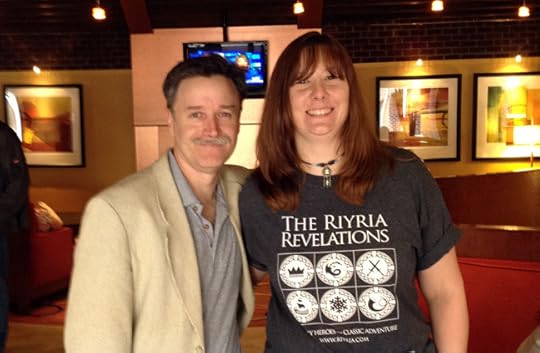 Melissa wearing a very stylish t-shirt
Melissa wearing a very stylish t-shirtMelissa is a wonderful blogger, (My World in Words and Pages) one the very first who discovered me and helped to spread the word. She didn’t just review my books, she became an advocate for me all over the net-a-verse and really helped launch my career. This was a woman I owed a lot to, and if I was able to recognize anyone at the con, I was so glad it was her.
When I sat on panels I found a change as well. Some of my fellow panelist knew me, even though I still had my badge in my pocket. Those who didn’t, smiled warmly after hearing my obligatory intro bio. Again, I had that looking-over-my-shoulder-for-the-person-their-really-looking-at sensation.
For old times’ sake I visited the dealer’s room. Same tables, different faces—like taking the Alcatraz tour after having been an inmate. I paused to look at a rack of books and spotted the indie publisher who had been on a panel with me.
“Hi,” he said with a big smile. I used to do that too. After three days, your face hurts. The publisher narrowed his eyes. “You know, in all the time we were on the panel, you never mentioned the name of your book.”
In case you don’t know—if you haven’t been to a con—panels consist of a hotel room where a table is set up and a few people sit and speak on a topic before an audience. The point of this, for most authors, is to get face-time with potential fans to promote themselves. You’re supposed to stand your book up in front of you and plug yourself so if people find they like you based on your panel performance, they might buy your book. Only I wasn’t there to sell my books. I was just there to help Tee Morris on the panel he was moderating, which was on the subject of Making the Jump from Self to Corporate Publishing. I hadn’t planned, didn’t expect, and didn’t even want to be on these other panels, but they had all these schedules printed up. All these people planned to go. So I went.
But as I said things were different this time. The topics were more sensible, mostly on publishing, and a number of people in the audience appeared very appreciative of what was said. One man actually stopped me on the way out of one session and said, “That was really great. It was nice to hear from someone who actually knows what he’s talking about.” I presumed he meant me, but I didn’t ask in case I was wrong.
But I never brought a book, nor did I mention my series. And as I said, I didn’t even wear my name tag. The man in the dealer’s room was very puzzled. Maybe a lot of people were, except perhaps the guy who stopped me on the way out of that one session.
I spent the second night in the bar with author Collin Earl and his pals, along with Jon Sprunk, Mel Hay and her brother. The night after that it was dinner with Nathan Lowell and his charming companion, then back to the bar with Myke Cole, Peter Brett, Scott Sigler, and Justin comparing book covers and discussing bad titles. Later, we hooked up with Tee Morris, and a woman bought me a drink—sadly I never even caught her name.
This was a very different con.
I was treated like I a real author—as if everyone got together in a secret meeting and voted me into the club, but I never got the memo.
Maybe I’ll attend another one.
Published on May 29, 2012 12:56
May 22, 2012
Fan Art
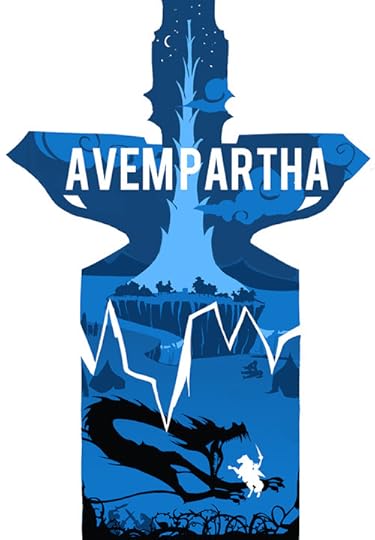
I was asked on the Riyria Facebook page if there was any fan art for the series. I only knew of the one, but then I looked and found three. The color one was done by my daughter, not sure if that is technically still fan art, I suppose it is, and I like it so I'm calling it fair. Notice how it is in the shape of a sword that is broken. Clever girl. (To see more of my daughter's art.)
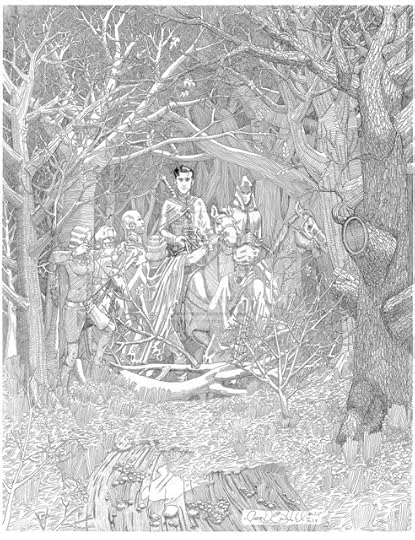 If I've learned something from this picture it's that line-work is like a fine Pinot Noir, it's subtle, it's full of life and energy, it hides and suggests, and too much of it gives you a headache...well, when you're the one making the picture anyway. The image, though, is finally done and I'm quite pleased with it. It's from the first pages of Michael J. Sullivan's "Riyria Revelations" when our heros, Hadrian Blackwater and Royce Melborn, master thieves, are held up by a group of...thieves. No more spoilers than that for anyone who hasn't read it, which is unfortunately a large number. If you haven't, read it! By the way, I have promised myself no more trees for a while...however I do have quite the habit of breaking promises and self-torture...
If I've learned something from this picture it's that line-work is like a fine Pinot Noir, it's subtle, it's full of life and energy, it hides and suggests, and too much of it gives you a headache...well, when you're the one making the picture anyway. The image, though, is finally done and I'm quite pleased with it. It's from the first pages of Michael J. Sullivan's "Riyria Revelations" when our heros, Hadrian Blackwater and Royce Melborn, master thieves, are held up by a group of...thieves. No more spoilers than that for anyone who hasn't read it, which is unfortunately a large number. If you haven't, read it! By the way, I have promised myself no more trees for a while...however I do have quite the habit of breaking promises and self-torture...Any comments and criticisms are, of course, welcome.
Pen and ink on Bristol Board
Jesse Bechtold did these other two. One of which I already posted, but am reposting here because I can. (To see more of Jesse's work.)
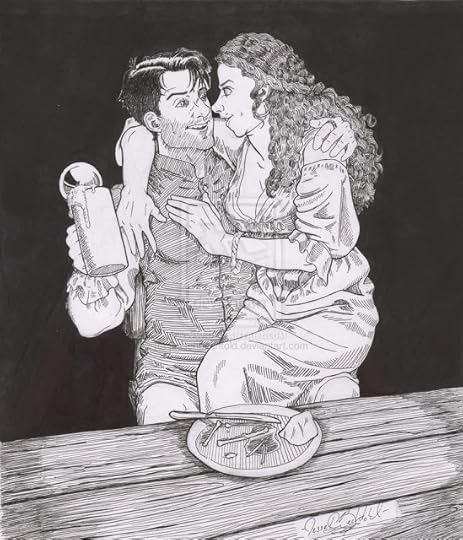
This illustration is inspired by a small event in a book called "The Crown Conspiracy", part of a book series called "The Riyria Revelations" by Michael J. Sullivan. If you haven't heard of it it's about two thieves in a medieval style world accidentally getting caught up in a bid to create a new world empire. It's good fun, so I'd recommend it to anyone wanting a good adventure to read. Anyway, this started as a doodle to try to nail one of the main characters, Hadrian Blackwater, but I was having a lot of fun with the barmaid so I just kept going. What can I say, I have a thing for busty, size twelve barmaids...just ask my fiance'. More illustrations from this book to come and any comments welcome!
Pen and Ink on Paper
Thanks to both for illuminating my world.
Published on May 22, 2012 09:10
May 21, 2012
What He Said
On the one hand I am pleased to discover that so many of my views and experiences as an author are mirrored by such an accomplished writer as Mr. Gaiman, as it makes me think I'm doing something right. On the other hand I have no idea what I will say now if I am ever asked to give a commencement speech. I might be reduced to the he-took-my-answer defense. And of course, he did it much better than I ever could.
Published on May 21, 2012 11:32



